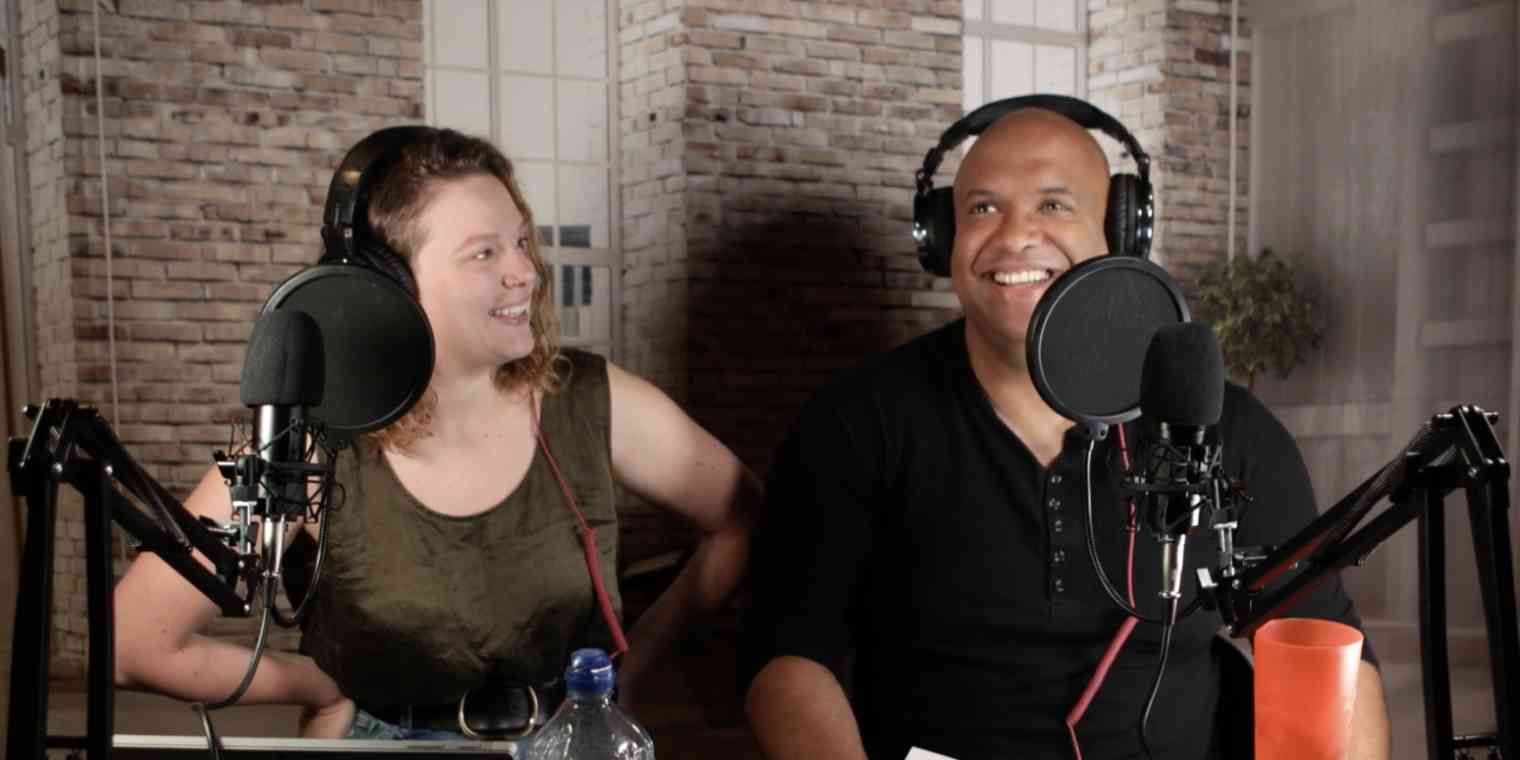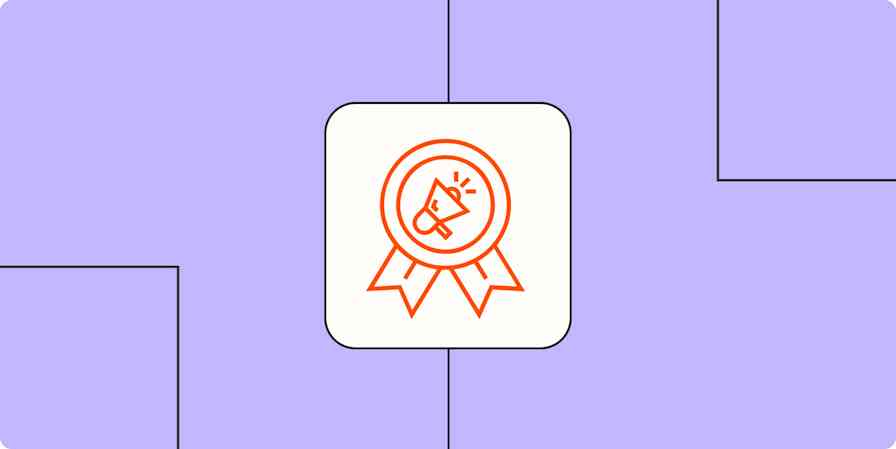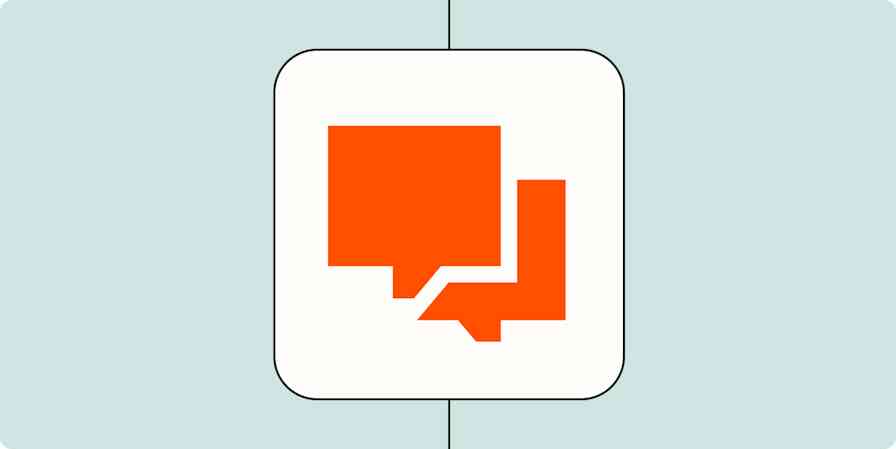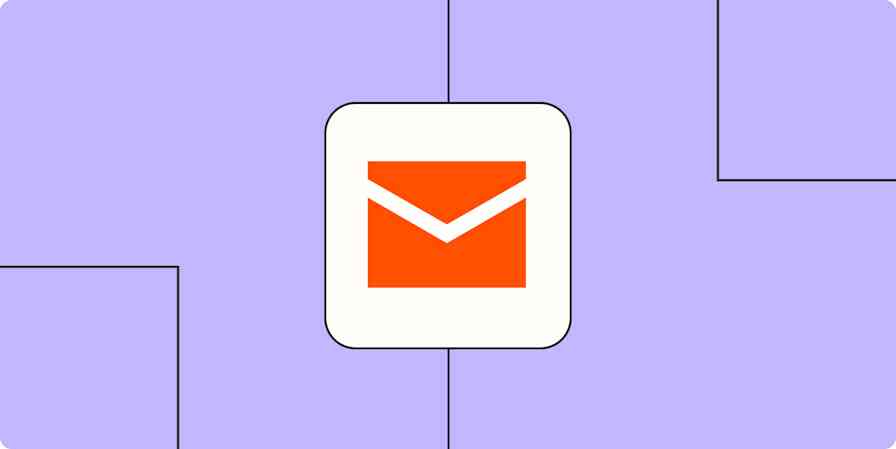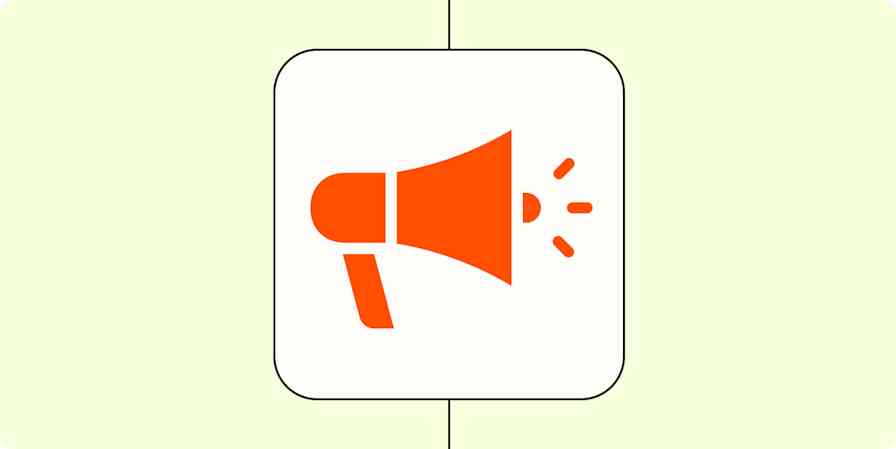Like the thought of starting a podcast? It's a big commitment, but it comes with some great rewards. I've been a podcast producer, editor, and host for over five years, and to me, podcasts are one of the best, most authentic content marketing tools out there.
The problem is, I'm not alone in thinking that: there are over 2.5 million podcasts available today. So, should you start a podcast for your business with that kind of competition? I can't really answer that question for you because—sorry—it depends.
But let's dive into some of the pros and cons of starting a podcast.
The pros of starting a podcast for your business
1. Marketing and brand awareness
Podcasts are a great marketing tool. Every episode equals valuable content that can easily be consumed and shared on the go and offers endless opportunities for promotion, advertising, and partnerships.
Blogs still tend to rank higher in terms of discoverability because Google loves words. But the blogging market is just a teeny bit more saturated. Over 70 million new posts per month are published on WordPress alone.
On a similar note, podcasting (or any form of audio/video content, really) opens your business up to a much wider target audience, increasing your brand awareness. It's hard to find another content marketing tool that can help you work with massive platforms like Audible, Spotify, YouTube, and Twitch.
There's plenty of overlap between podcast listeners, YouTube watchers, blog readers, and social media users, but podcasting done right allows you to capture audiences across multiple mediums.
3. Credibility
Podcasts also come with some hefty credibility. By highlighting yourself, your team, or your company as an expert, you can easily build up brand authority. Attaching your business name to thought leaders and subject matter expert guests doesn't hurt either.
3. Lead generation
I can't really discuss podcasting as a content marketing tool without mentioning lead generation. Podcasting can be its own lead generation tool, though not always as directly as, say, a webinar.
Instead, podcast episodes can become an introduction to your sales funnel, similar to a blog post with a call-to-action. Those CTAs can lead potential customers to download supporting content, like free resources or tools, join your email list, or book a free consultation.
4. Relationship-building
Finally, podcasting helps you get closer to your target audience in a very tangible way: by speaking directly to them. Few content marketing strategies combine wide reach with intimacy the way podcasts do, especially if you have a topic and enough knowledge of your audience to address their needs and questions.
Another great perk? You can also bring your customers on as guests, which means free cross-promotion and the opportunity to dive a bit deeper into your target market.
I currently produce and co-host mental health podcast Bettermental with my good friend, keynote speaker Mike Veny. In the past few years, my podcast has helped me develop business contacts in my niche (future of work and wellness), take on new professional challenges, and pursue my passion for mental health in the workplace.
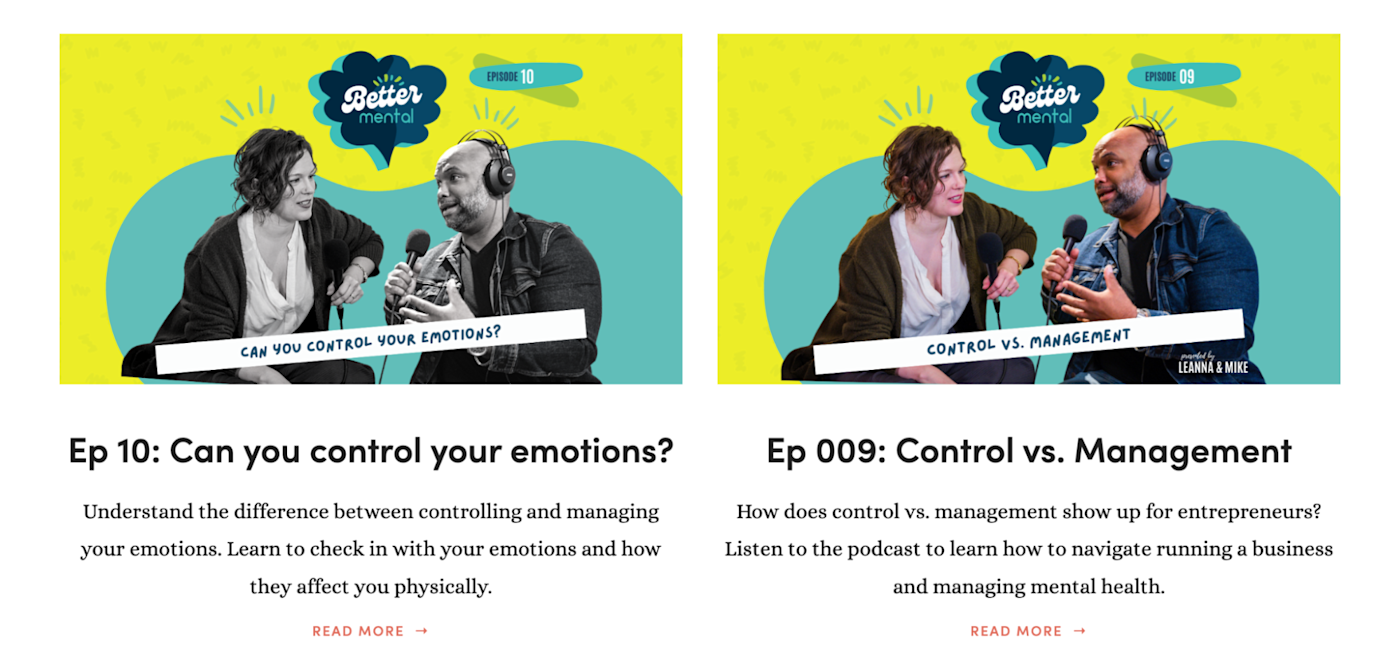
The cons of starting a podcast
I know I'm a bit biased, but don't worry, I have some cons to share too. Podcasting doesn't have a lot of downsides in my experience, but there are a few potential concerns.
1. Podcasting is a "slow burn" strategy
While having a business podcast can give you instant credibility, it doesn't generate interest or downloads overnight, so those leads could take months, even years, to show up.
2. It takes a lot of (good) content to make a difference
Similar to YouTube or business blogs, a successful podcast is a careful combination of lots of quality content and clever marketing. A small majority of podcasts are immediate successes, but most have to produce dozens of episodes to see those numbers rise.
3. Podcasts cost
You can absolutely start a podcast in your basement with your smartphone, but is that really a good business decision? Quality content costs time, energy, and money—and remember, your return on investment may not show up for a while.
In a nutshell, you probably shouldn't start a podcast if…
You don't have a clear topic in mind that you know will bring value to your target customer base.
You don't have the budget or resources to produce quality content (you just want to play around with it).
You're looking for a "quick" marketing win.
Have I put you off yet? It's important to be realistic, so think carefully before you make a final decision.
What do you need to start a podcast?
Let's assume you've got a great idea, the concept fits into your business and marketing plan, and you can get a budget together. What's next? Four words: topic, type, team, and tools.
1. Topic
You have to break that idea down into workable seasons and individual episodes. You don't need to worry about scripting just yet, but do go ahead and start brainstorming episode titles and summaries and see how many you can come up with. 10? 20? Infinite numbers? The more the better! This list will be a great jumping-off point for developing content with your team later.
2. Type
What type of podcast will you be? Laid back and conversational or structured and scripted? Do you want guests, just hosts, or a single subject matter expert? In five years of podcasting, I've worked on three iterations of our show: The Mike Veny Show, MxV, and Bettermental. While The Mike Veny Show started as a structured, more Q&A-type podcast, it became more and more conversational as time went on. With Bettermental, we're also now experimenting with video podcasting.
Here's a list of podcast style types to get you started.
3. Team
Unless you've got endless time on your hands, you're going to need some help. Will you need a producer, host(s), scriptwriter, editor or audio engineer, social media person, and marketer or promoter? In most cases, it might be wise to have a team that wears multiple hats until you have time to ramp up. I started as the editor, producer, and co-host and now oversee our post-production and promotional teams.
4. Tools
Let's talk about how you're going to produce this thing. Will it be in-person or virtual? Do you want heavy-duty recording equipment or mics you can attach to a computer? What will you or your team use to edit your podcast? Zapier also has some nifty automation hacks for podcast management.
You can choose to host on your podcast website or on a hosting platform. We chose the second option because it made getting our podcasts on major platforms, like Apple Podcast, easier, and it tracks all our downloads for us. There are dozens, if not hundreds, of hosting platforms out there, and features like live streaming, video podcasting, number of guest tracks, and ad or sponsorship programs will vary on each one.
A note about your audience
Generally with business podcasts, your target listening audience is the same as your customer base. So to help you prepare, start compiling all the info you have on your current and ideal customers or clients. Think about what type of content they like to consume, and the questions they may have about your services, products, and industry.
If you sell authentic Victorian reproduction jewelry online, for example, your customers may be interested in how to care for jewelry, cosplay opportunities, or the history behind your designs. This is another great way to start building out content for each episode.
The good news is, you don't need tons of listeners to have a successful podcast; you just need to be reaching the right people, whether they're an audience of 10 or 10 million.
Planning out your content
If you know the who, what, and where, you can dig a little deeper. Have you thought about the "when" yet?
Choosing the frequency launch dates for your podcast will dictate the number of episodes in a season (if you do seasons), your production schedule, and the budget you'll need to produce it. Unless you're paying your team hourly, most production professionals will charge by episode per month.
There's no denying that a biweekly or weekly podcast is likely to see quicker growth and generate more traffic in a shorter time frame. But when my co-host and I started developing our podcast together, we realized that a monthly podcast worked best for our schedules. We also prefer to record in person, which means we fly across the country to meet up several times a year.
Consider:
Your schedule and capabilities (especially if you're directly involved in production)
Your host(s) and production team's schedule and capabilities
How each episode will be recorded (pre-recorded or live)
Your production budget
The same goes for the launch days and times you choose. Depending on your time zone, location, industry, and audience, different days of the week or times of day might work better for you. Bettermental's audience is primarily business owners, so we publish episodes early Monday morning (I'm talking 3 a.m.).
Scripting podcast episodes
Your content creation process may vary depending on how frequently you publish. But typically, you'll start with an overall concept, break it down into chunks, such as a season or a month's worth of content, and build out the episodes from there.
You can develop the episodes all at once ahead of time, storyboard as you go along, or do a mix of both. Mike and I have a standing call every week for discussion and brainstorming. We try to have our season theme nailed down before the current season is finished in June, so we have the summer to build out our calendar before our September launch.
We then decide which episodes will be pre-recorded (usually the first four or five episodes and anything evergreen or without a guest) and then outline each episode on our weekly calls. Over time, our outlines have become less detailed as we focus on being more conversational and spontaneous.
How to promote a podcast
There are a million ways to promote a podcast, and I can't cover them all. Instead, I'll share a few that my co-host and I have focused on more over the years.
1. Podcast branding
Think about what you want your podcast to look like (remember, it's an extension of your business brand!). Whether it lives on your business website or a hosting site webpage, you can stand out with visuals like a branded logo, social media graphics, and banners.
The first few versions of our show had pretty basic branding, but we decided to invest more heavily in visuals for Bettermental, going with a playful, very colorful, almost retro feel.
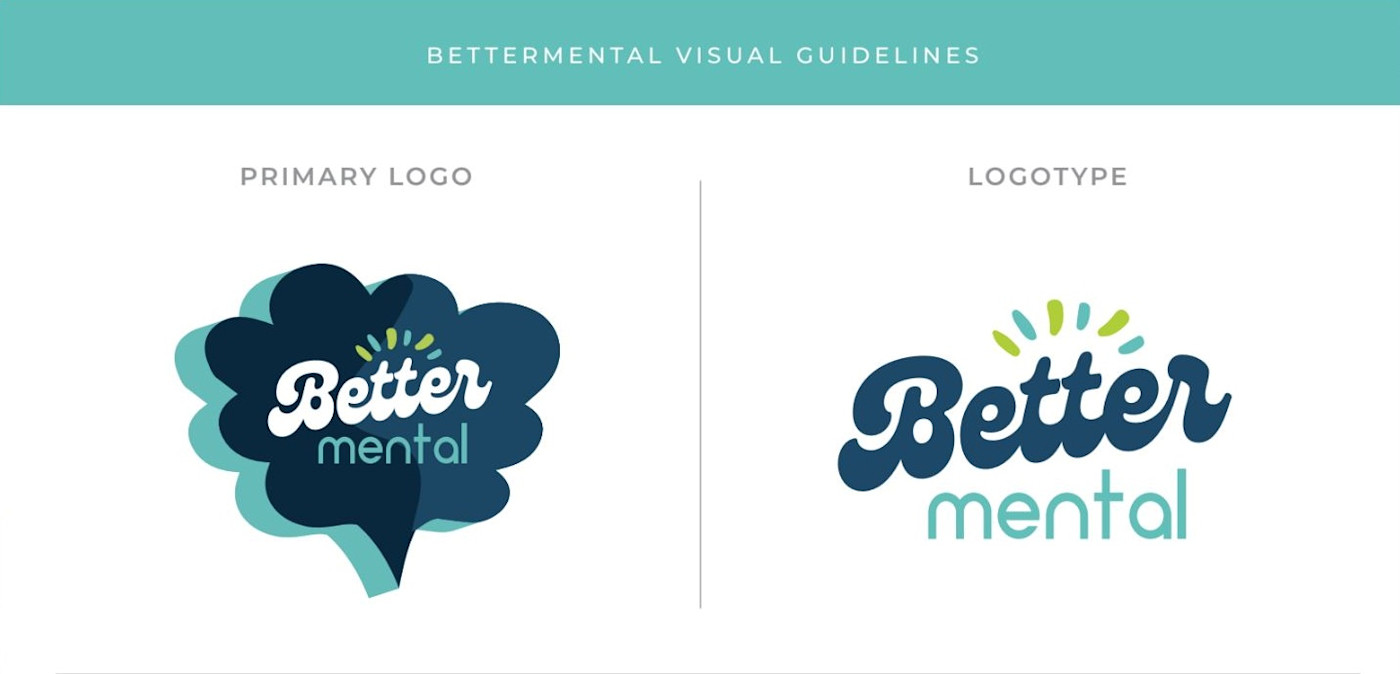
2. Promotional elements
It took us a while, but over time, Mike and I learned that our podcast needed:
An intro and outro for each episode (these have evolved over time)
Introductory episodes and videos for the podcast itself
Host intros, which we're still working on two seasons in
A podcast trailer for each season introducing the new theme and calendar
3. Marketing plan
A good podcast marketing plan will cover how you plan to:
Announce new episodes. Guest announcements, quote graphics, and audiograms are all great ways to tease upcoming content on social media.
Promote episodes during launch day/week. Another great time to use graphics. We love our new episode graphics and working with guests to cross-promote new episodes by tagging and quoting them.
Maintain traction with related content. Avoid one-note marketing by creating additional content like blog posts, free resource downloads, or behind-the-scenes Q&A videos that will keep your audience coming back even after they've heard the episode.
Recycle evergreen content. Don't stop promoting older episodes just because they were published a while ago! If you have multiple episodes on similar topics, promote them after your new episode has launched, or consider repurposing them into related content.
So, should I start a podcast?
Podcasts are a commitment, and it takes a lot to get them right. But they can also be an amazing strategy for connecting with your audience, building relationships, and establishing yourself as an expert in your industry. It's been a lot of work for us—and it isn't cheap—but I certainly don't regret it.
Related reading:
